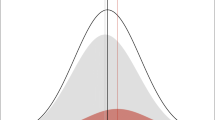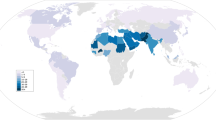Abstract
Non-therapeutic genetic testing in childhood presents a “myriad of ethical questions”; questions which are discussed and resolved in professional policy and position statements. In this paper we consider an underdiscussed but strongly influential feature of policy-making, the role of selective case and exemplar in the production of general recommendations. Our analysis, in the tradition of rhetoric and argumentation, examines the predominate use of three particular disease exemplar (Huntington’s disease, Tay-Sachs disease and sickle cell disease) to argue for or against particular genetic tests (predictive testing and testing for carrier status). We discuss the influence these choices have on the type and strength of subsequent recommendations. We argue that there are lessons to be drawn about how genetic diseases are conceptualised and we caution against the geneticisation of medical policy making.
Similar content being viewed by others
Notes
Genetic testing refers to the analysis of a specific gene, its product or function, or other DNA and chromosome analysis, to detect or exclude an alteration likely to be associated with a genetic disorder (Harper, 1997). Testing can be specifically distinguished from screening which is the same practice across populations.
The Human Genetics Commission (The UK Government’s advisory body on new developments in human genetics) has recently commissioned an analysis of its own consultative process.
We appreciate that the discursive nature of policy making is multi-modal [20]. We use the term writers here as we are dealing directly with printed documents.
References
American Academy of Pediatrics (2001) Ethical issues with genetic testing in pediatrics (RE9924). Pediatrics 107:1451–1455
American Medical Association (1996) Genetic testing of children (Policy, E-2.138) December, 2002 at http://www.ama-assn.org
American Society of Human Genetics and American College of Medical Genetics (1995) Points to consider: ethical, legal and psychosocial implications of genetic testing in children and adolescents. Am J Human Genet 57:1233–1241
Beauchamp TL, Childress JF (1994) Principles of biomedical ethics, 4th edn. Oxford University Press
Belgian Society of Human Genetics (2003) Guidelines for predictive genetic testing for late onset disorders. November 2003 at http://www.beshg.be/Pages/guidelines.html
Billig M (1996) Arguing and thinking: a rhetorical approach to social psychology. Cambridge University Press
Canadian Pediatric Society (2003) Guidelines for genetic testing of health children (B 2003-01). Paediatr Child Health 8(1):42–45
Chambers T (1999) The fiction of bioethics. Routledge, New York
Charrow J (2004) Ashkenazi Jewish genetic disorders. Familial Cancer 3:201–206
Clarke AJ, Flinter F (1996). The genetic testing of children: A clinical perspective. In Marteau TM, Richards MPM (eds), The troubled helix: social and psychological implications of the new human genetics. Cambridge University Press, Cambridge, pp 164–176
Clinical Genetics Society (1994) The genetic testing of children: report of a working party of the clinical genetics society (UK). Med Genet 31:785–797
Cohen CB (1998). Moving away from the Huntington’s disease paradigm in the predictive genetic testing of children. In Clarke AJ (Ed.), The genetic testing of children. Bios Scientific Publishers, Oxford, pp 133–143
Edmondson R (1984) Rhetoric in sociology. Macmillan, London
Edwards D (2000) Extreme case formulations: softeners, investment and doing nonliteral. Res Lang Soc Interact 33(4):347–373
Fischer F, Forester J (1993). Editor’s introduction. In Fischer F, Forester J (Ed.), The argumentative turn in policy analysis and planning. Duke University Press, Durham and London, pp 1–17
Foucualt M (1972) The archaeology of knowledge. Routledge, London
GIG (1995) Genetics interest group response to the UK clinical genetics society report “The Genetic Testing of Children”. J Med Genet 32:490–491
Gillam L (1997) Arguing by analogy in the fetal tissue debates. Bioethics 11(5):397–412
Gillon R (1994) Medical ethics: four principles plus attention to scope. BMJ 309:184–8
Hajer M (1993) Discourse coalitions and the institutionalisation of practice: the case of acid rain in Britain. In Fischer F, Forester J (Eds.), The argumentative turn in policy analysis and planning. UCL Press, London
Harper PS, Clarke AJ (1990) Should we test children for “Adult” genetic diseases? Lancet 305:1205–1206
Hastings A (1996) Unravelling the process of “Partnership” in urban regeneration policy. Urban Studies 33(2):253–268
Hogben S, Boddington P (2005) Policy recommendations for carrier testing and predictive testing in childhood: a distinction that makes a real difference. J Genet Couns 14:271–282
Horsfall J, Cleary M (2000) Discourse analysis of an “Observation Levels” nursing policy. J Adv Nurs 32(5):1291–1297
Jorde L Carey JC, Bamshad MJ, White RL (2000) Medical genetics, 2nd edn. Mosby, St Louis
Kabach MM (2000) Population-based genetic screening for reproductive counselling: The Tay-Sachs disease model. Eur J Pediatr 159(Suppl 3):S192–S195
Lemke T (nd) Disposition and determinism—genetic diagnostics in risk society. Available September, 2004 at http://www.thomaslemkeweb.de/engl.%20texte/Disposition%20and%20Determinism.pdf
Lippmann A (1991) Prenatal genetic testing and screening: constructing needs and reinforcing inequities. Am J Law Med 15:15–50
Macintyre S (1997) Social and psychological issues associated with the new genetics. Philos Trans R Soc Lond 352:1095–1101
Majone G (1989) Evidence, argument and persuasion in the policy process. Yale University Press, New Haven, CT
Murphy P, Maynard ML (2000) Framing the genetic testing issue: Discourse and cultural clashes among policy communities. Sci Commun 22(2):133–153
National Society of Genetic Counselors (1995) Resolutions ballot: prenatal and childhood testing for adult-onset disorders. National Society of Genetic Counselors, Wallingford, PA
Prior P (1998) Writing/disciplinarity: a sociohistoric account of literate activity in the academy. Erlbaum, Mahwah, NJ
Rein M, Schön D (1991) Frame-reflective discourse. In Wagner P, Weiss CH, Wittrock B, Wollmann H (Eds.), Social sciences and modern states. Cambridge University Press, Cambridge, pp 262–289
Rein M, Schön DA (1993) Reframing policy discourse. In Fischer F, Forester J (Eds.), The argumentative turn in policy analysis and planning. Duke University Press, Durham and London, pp 145–166
Rosch E (1975) Family resemblance: Studies in the internal structure of categories. Cogn Psychol 7:573–605
Ross LF, Moon MR (2000) Ethical issues in genetic testing of children. Arch Pediatr Adolesc Med 154:873–879
Rydin Y (1999) Can we talk ourselves into sustainability? The role of discourse in the environmental policy process. Env Values 8:467–484
Taleff MJ, Babcock M (1998) Hidden themes: dominant discourses in the alcohol and other drugs field. Int J Drug Policy 9:33–41
Throgmorton J (1993) Planning as a Rhetorical Activity. J Am Plann Assoc 59(3):334–346
Wexler NS (1992) The Tiresias Complex: Huntington’s disease as a paradigm of testing for late-onset disorders. Fed Am Soc Exp Biol J 6:2820–2825
Wittgenstein L (1953) Philosophical investigations. Blackwell, Oxford
Author information
Authors and Affiliations
Corresponding author
Appendix
Genetic Conditions Used in Argumentation in the Data | Number of Times | |
|---|---|---|
Adult Onset Blindness/Retinoblastoma | 2 | |
Alpha-1 Antitrypsin Deficiency | 1 | |
Alzheimer’s Disease | 2 | |
Balanced Chromosomal Translocations | 2 | |
Coronary Heart Disease | 2 | |
Cystic Fibrosis | 4 | |
Diabetes | 2 | |
Duchenne’s Muscular Dystrophy | 2 | |
Familial Adenomatous Polyposis Coli | 2 | |
Familial Hyperlipidema | 1 | |
Fragile X | 3 | |
Friedreich’s Ataxia | 1 | |
Haemochromotosis | 1 | |
Haemoglobin Disorders | 2 | |
Hereditary Cancers (incl BRCA1)* | 6 | |
Hypertension | 1 | |
Huntington’s disease | 16 | |
Multiple Endocrine Neoplasia | 1 | |
Myotonic Dystrophy | 2 | |
Neurofibromatosis | 1 | |
Phenylketonuria | 1 | |
Polycystic Kidney Disease | 2 | |
Prion Dementia | 2 | |
Sickle Cell | 8 | |
Tay Sachs | 6 | |
Von Hippel Landau Disease | 1 | |
Rights and permissions
About this article
Cite this article
Boddington, P., Hogben, S. Working Up Policy: The Use of Specific Disease Exemplars in Formulating General Principles Governing Childhood Genetic Testing. Health Care Anal 14, 1–13 (2006). https://doi.org/10.1007/s10728-006-0007-7
Published:
Issue Date:
DOI: https://doi.org/10.1007/s10728-006-0007-7




